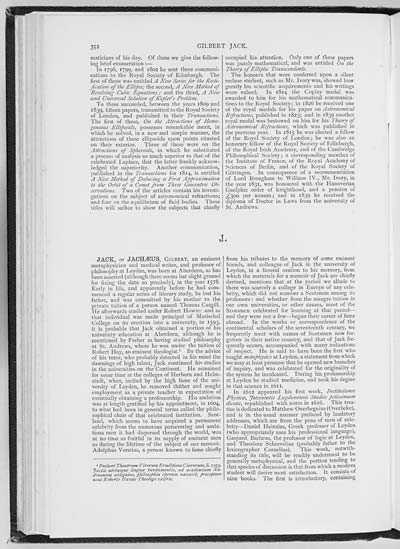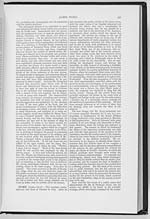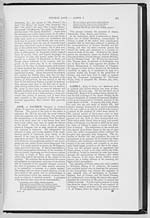352
maticians of his day. Of these we give the follow-
ing brief enumeration:�
In 1796, 1799, and 1802 he sent three communi-
cations to the Royal Society of Edinburgh. The
first of these was entitled A New Series for the Recti-
fication of the Ellipse; the second, A New Method of
Resolving Cubic Equations; and the third, A New
and Universal Solution of Kepler's Problem.
To these succeeded, between the years 1809 and
1839, fifteen papers, transmitted to the Royal Society
of London, and published in their Transactions.
The first of these, On the Attractions of Homo-
geneous Ellipsoids, possesses remarkable merit, in
which he solved, in a new and simple manner, the
attractions of these ellipsoids upon points situated
on their exterior. Three of these were on the
Attractions of Spheroids, in which he substituted
a process of analysis so much superior to that of the
celebrated Laplace, that the latter frankly acknow-
ledged the superiority. Another communication,
published in the Transactions for 1814, is entitled
A New Method of Deducing a First Approximation
to the Orbit of a Comet from Three Geocentric Ob-
servations. Two of the articles contain his investi-
gations on the subject of astronomical refractions;
and four on the equilibrium of fluid bodies. These
titles will suffice to show the subjects that chiefly
occupied his attention. Only one of these papers
was purely mathematical, and was entitled On the
Theory of Elliptic Transcendents.
The honours that were conferred upon a silent
recluse student, such as Mr. Ivory was, showed how
greatly his scientific acquirements and his writings
were valued. In 1814 the Copley medal was
awarded to him for his mathematical communica-
tions to the Royal Society; in 1826 he received one
of the royal medals for his paper on Astronomical
Refractions, published in 1823; and in 1839 another
royal medal was bestowed on him for his Theory of
Astronomical Refractions, which was published in
the previous year. In 1815 he was elected a fellow
of the Royal Society of London; he was also an
honorary fellow of the Royal Society of Edinburgh,
of the Royal Irish Academy, and of the Cambridge
Philosophical Society; a corresponding member of
the Institute of France, of the Royal Academy of
Sciences of Berlin, and of the Royal Society of
Gottingen. In consequence of a recommendation
of Lord Brougham to William IV., Mr. Ivory, in
the year 1831, was honoured with the Hanoverian
Guelphic order of knighthood, and a pension of
�300 per annum; and in 1839 he received the
diploma of Doctor in Laws from the university of
St. Andrews.
J.
JACK, or JACHJEUS, GILBERT, an eminent
metaphysician and medical writer, and professor of
philosophy at Leyden, was born at Aberdeen, as has
been asserted (although there seems but slight ground
for fixing the date so precisely), in the year 1578
Early in life, and apparently before he had com-
menced a regular series of literary study, he lost his
father, and was committed by his mother to the
private tuition of a person named Thomas Cargill.
He afterwards studied under Robert Howie: and as
that individual was made principal of Marischal
College on its erection into a university, in 1593,
it is probable that Jack obtained a portion of his
university education at Aberdeen, although he is
mentioned by Freher as having studied philosophy
at St. Andrews, where he was under the tuition of
Robert Hay, an eminent theologist.1 By the advice
of his tutor, who probably detected in his mind the
dawnings of high talent, Jack continued his studies
in the universities on the Continent. He remained
for some time at the colleges of Herborn and Helm-
stadt, when, incited by the high fame of the uni-
versity of Leyden, he removed thither and sought
employment as a private teacher in expectation of
eventually obtaining a professorship. His ambition
was at length gratified by his appointment, in 1604,
to what had been in general terms called the philo-
sophical chair of that celebrated institution. Scot-
land, which seems to have acquired a permanent
celebrity from the numerous persevering and ambi-
tious men it had dispersed through the world, was
at no time so fruitful in its supply of eminent men
as during the lifetime of the subject of our memoir.
Adolphus Vorstius, a person known to fame chiefly
1 Freheri Theatrum Virorum Eruditione Clarorum, ii. 1353.
Jactis utriusque lingua fundamentis, ad academiam An-
dreanam ablegatzts, philosophia operam navavit, preceptors
usus Roberto Hav�o Theologo exifrio.
from his tributes to the memory of some eminent
friends, and colleague of Jack in the university of
Leyden, in a funeral oration to his memory, from
which the materials for a memoir of Jack are chiefly
derived, mentions that at the period we allude to
there was scarcely a college in Europe of any cele-
brity, which did not number a Scotsman among its
professors : and whether from the meagre tuition in
our own universities, or other causes, most of the
Scotsmen celebrated for learning at that period�
and they were not a few�began their career of fame
abroad. In the works or correspondence of the
continental scholars of the seventeenth century, we
frequently meet with names of Scotsmen now for-
gotten in their native country, and that of Jack fre-
quently occurs, accompanied with many indications
of respect. He is said to have been the first who
taught metaphysics at Leyden, a statement from which
we may at least presume that he opened new branches
of inquiry, and was celebrated for the originality of
the system he inculcated. During his professorship
at Leyden he studied medicine, and took his degree
in that science in 1611.
In 1612 appeared his first work, Institutiones
Physic�, Juventutis Lugdunensis Studiis potissimum
dicah�, republished with notes in 1616. This trea-
tise is dedicated to Matthew Overbeguius (Overbeke),
and is in the usual manner prefaced by laudatory
addresses, which are from the pens of men of cele-
brity�Daniel Heinsius, Greek professor of Leyden
(who appropriately uses his professional language),
Gaspard Barl�us, the professor of logic at Leyden,
and Theodore Schrevelius (probably father to the
lexicographer Cornelius). This work, notwith-
standing its title, will be readily understood to be
generally metaphysical, and the portion tending to
that species of discussion is that from which a modern
student will derive most satisfaction. It consists of
nine books. The first is introductory, containing

![]() Universal Viewer |
Universal Viewer | ![]() Mirador |
Large image | Transcription
Mirador |
Large image | Transcription
![]()

